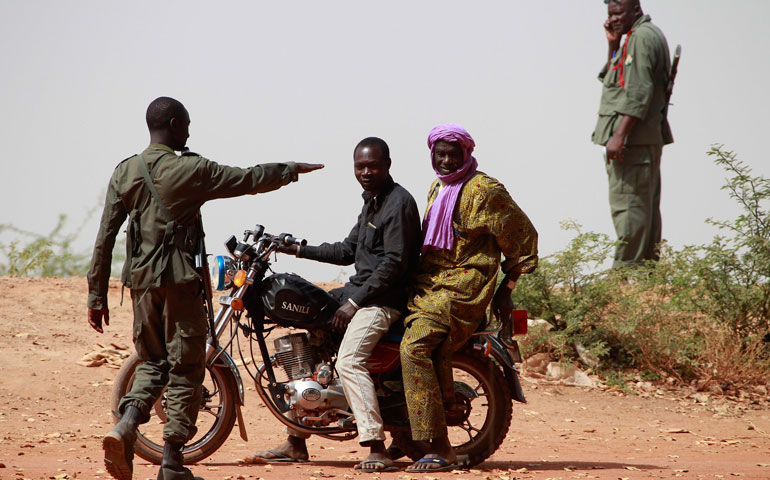
A Malian soldier checks two civilians riding on a motorcycle Jan. 24 in Diabaly, which was recently liberated by French and Malian forces from Islamic rebels. (CNS/Reuters/Eric Gaillard)
The war in Mali is not simply a result of the perfidy of Islamist extremists or another case of a dysfunctional or "failed" African state, though these are certainly contributing factors. The ongoing war in this impoverished, landlocked former French colony is first and foremost yet another example of the phenomenon known as "blowback," where an initially successful Western military intervention eventually results in unanticipated tragic consequences.
The 2011 NATO military intervention in Libya was justified initially as a humanitarian effort in response to severe repression by the regime of Moammar Gadhafi. However, the Western military effort went well beyond the U.N. Security Council mandate to protect civilian lives, as the French, British and U.S. air forces -- along with ground support by the Saudi and Qatari dictatorships -- essentially allied themselves with the rebel armies. The African Union, while highly critical of Gadhafi's repression, condemned the intervention, fearing that the resulting chaos would result in Libya's vast storehouse of arms fueling local and regional conflicts elsewhere in Africa and destabilizing the region.
This is exactly what has transpired.
Whereas the nonviolent revolution against the neighboring Tunisian dictatorship resulted in a positive contagion of unarmed pro-democracy civil insurrections, the violent intervention in Libya resulted in a negative contagion of armed rebellions.
This is particularly tragic since Mali was, until recently, seen as one of the more hopeful political stories in Africa.
In 1991, more than two decades prior to similar pro-democracy uprisings in Tunisia and Egypt, Malians engaged in a massive nonviolent resistance campaign that brought down the dictatorship of Moussa Traoré. A broad mobilization of trade unionists, peasants, students, teachers and others created a mass pro-democracy movement throughout the country. Despite the absence of Facebook or the Internet, virtually no international media coverage, and the massacre of hundreds of peaceful protesters, this popular civil insurrection succeeded not only in ousting a repressive and corrupt regime, but ushered in more than two decades of democratic rule.
Despite corruption, poverty and a weak infrastructure, Mali was widely considered to be one of the most democratic countries in West Africa, with regular competitive elections. Independent radio stations and newspapers emerged and the country experienced lively and open political debate, giving Mali some of the highest rankings in Africa in terms of civil liberties and political rights.
History has shown that dictatorships overthrown through largely nonviolent civil insurrections are far more likely to evolve into stable democracies than dictatorships ousted through armed revolution or foreign intervention. Mali appeared to be a prime example of this phenomenon.
Indeed, soon after the March Revolution of 1991, the Malian government negotiated a peace agreement with armed rebels from the Tuareg minority in the north of the country, in which they agreed to end their rebellion in return for a degree of autonomy. In March 1996, there was a massive ceremonial burning of the rebels' surrendered weapons in the capital of Bamako.
By 2012, the Malian government, led by President Amadou Toumani Touré, was becoming increasingly unpopular, failing to address and even exacerbating structural inequalities reinforced by neoliberal edicts from international financial institutions and increasingly corrupt and self-serving political leaders, local business elites and the civil service. However, the aging president was scheduled to retire immediately following elections later in the year and it was hoped that a growing civil society movement and new leadership could more adequately address these problems.
However, a renewed rebellion in the north quickly overshadowed these concerns. Elements of the Malian army believed that Touré's government -- in part because of concerns that responding too harshly might create a backlash among the Tuaregs and in part because of its corruption and ineptitude -- did not adequately support resistance to the rebels. On March 22, U.S.-trained army Capt. Amadou Sanogo and other officers staged a coup and called for U.S. intervention along the lines of Afghanistan and the "war on terror."
Sanogo's training in the United States is just one small part of a decade of growing U.S. military involvement with allied armies in the Sahel, increasing the militarization of this impoverished region and the influence of armed forces relative to civilian leaders.
With supporters of the ousted democratically-elected government protesting in the capital and the army divided by the coup, Tuareg rebels took advantage of the chaos in the south quickly consolidated their hold on the northern part of the country, declaring an independent state.
Then, with the Malian army routed and Tuareg forces stretched thin, radical Islamist groups, also flush with new arms resulting from the Libya war, seized most of the towns and cities in the north. These extremists overran additional U.S.-supplied Malian army posts, seizing 87 Land Cruisers, satellite phones, navigation aids and other equipment provided by the American taxpayer.
Most tragically for the people of the region, these Islamist extremists began imposing a Taliban-style totalitarian rule.
This savage repression, the potential threat from an al-Qaida-affiliated regime, loss of access to the region's military wealth, and indications that the Islamists were moving south prompted direct French military intervention in January. The United States is supporting the French effort by transporting French troops and equipment and providing reconnaissance through satellites and drones.
Under such dire circumstances, even many people normally critical of Western neocolonialism argue that such military intervention may be the least bad option at this point. However, given that it was Western intervention and militarization of the region that largely created this mess in the first place, it inevitably raises the question as to whether it will actually end up making matters worse.
[Stephen Zunes is a professor of politics and chair of Middle Eastern studies at the University of San Francisco.]

